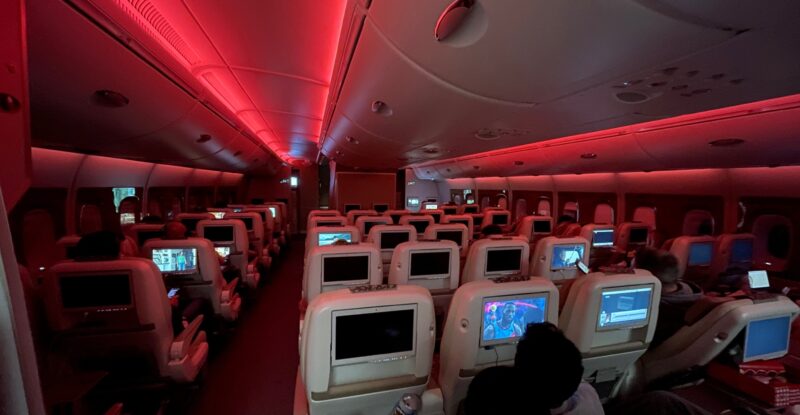Portable chargers, also known as power banks, have been making headlines again after overheating and creating smoke and fire events in aircraft cabins, including aboard a KLM 777 on 6 August, and a Delta 757 on 7 July.
Now, following a comprehensive safety review, Emirates is taking decisive action to mitigate risk by completely banning the use of power banks on its aircraft.
“Using any kind of power bank is prohibited onboard Emirates’ flights, effective from 1 October 2025,” the Dubai-based airline says, citing safety as a “core value.”
It joins a growing list of airlines that have tightened protocol around power banks. Singapore Airlines, for instance, does not permit the usage or charging of power banks during flight.
Under Emirates’ new rules, customers may carry one power bank that is under 100Wh (watt-hours) though they are not permitted to use the power bank to charge any personal devices whilst on board the aircraft. This single allowable power bank must have ‘capacity rating information’ available in order to be accepted for transport, Emirates says.
Charging a power bank using the aircraft’s power supply is also not allowed, nor indeed is placing it in the overhead bin. Rather, the power bank must now be placed in the seat pocket or in a bag under the seat in front of the passenger — ensuring that cabin crew members can access it quickly should they need to extinguish a fire.
A rising threat to safety
The dangers posed by lithium batteries on board aircraft are well reported. If not handled and stored correctly, the batteries can become unstable and overheat, and they’ve been traced to a raft of smoke and fire incidents, both in aircraft cargo holds and cabins, including when smart phones are accidentally crushed in premium seats.
But as more and more passengers bring multiple devices on board, including portable chargers for said devices, battery-related air incidents are increasing.
The US Federal Aviation has already verified 43 such incidents for the first seven months of 2025, with a further four pending verification. Notably, a post-pandemic increase in events can be observed in the agency’s latest stats.
“There has been a significant growth in customers using power banks in recent years, resulting in an increasing number of lithium battery-related incidents onboard flights across the wider aviation industry,” Emirates notes in its statement.
The problem is so acute in industry that the European Union Aviation Safety Agency in May published new recommendations on battery carriage.
“Smart phones and computers powered by lithium batteries are now an inherent part of our daily lives, and we know that each passenger now takes four to five such items with them on a flight,” Jesper Rasmussen, Flight Standards Director at EASA said as the civil aviation safety regulator published new recommendations on battery carriage in May.
“Airlines and their ground staff need to make sure passengers know how to travel with these items responsibly. This includes prompting them to think carefully about not packing the devices in their check-in baggage but carrying them on board instead, so that they can be monitored and dealt with if something happens.”
Why power banks are subject to Emirates’ new policy
Noting that power banks primarily utilize lithium-ion or lithium-polymer batteries, Emirates, in a commendably in-depth statement about why it’s banning power bank usage explains:
The batteries contain lithium ions suspended in an electrolyte solution. The ions flow through the electrolyte, travelling back and forth between two electrodes as the battery charges and discharges. If the battery is overcharged or damaged, it may result in ‘thermal runaway.’
Thermal runaway in batteries is a self-accelerating process where heat generation within a battery cell exceeds its ability to dissipate heat, leading to a rapid and uncontrollable temperature increase. This can result in dangerous consequences like fire, explosions, and the release of toxic gases.
Most phones and sophisticated lithium battery-powered devices have an internal trickle system which slowly adds current into the battery to prevent overcharging, but many basic power banks may not have this safeguard, increasing the risk. All power banks are subject to the new rules onboard Emirates.
The airline expects the new regulations will “significantly reduce” risks associated with power banks.
RGN’s battery safety archive can be accessed here.
Featured image of Emirates A380 cabin credited to Jeremy Dwyer-Lindgren













